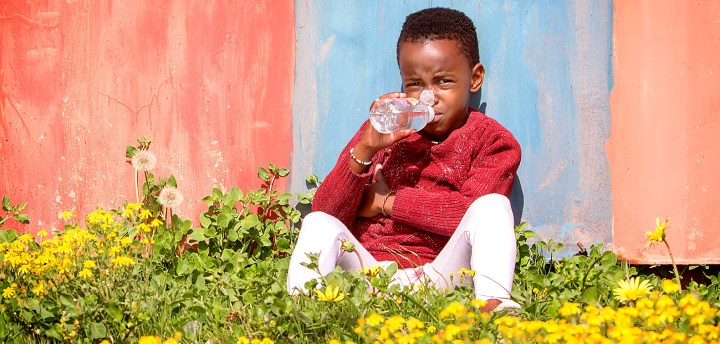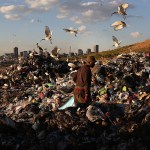MAVERICK CITIZEN EDITORIAL
Drought: Eastern Cape government’s failure to act makes a mockery of Women’s Month

August will see yet another silent disaster for thousands of Eastern Cape women who bear the brunt of persistent failures by all spheres of government to ensure water security during a debilitating drought.
With the Eastern Cape yet to escape from a debilitating drought, the provincial government’s failure to act makes a mockery of Women’s Month as women in many communities in the province bear the brunt of the water shortages.
Large parts of the province are in the grips of an unprecedented drought and there appears to be no consensus on when it will end.
The best-case scenario is that residents in the drought-stricken areas of the province are at the tail-end of a seven-year drought cycle. The worst-case scenario is that we just don’t know when it will end. Dam levels and water tables are so low that experts agree that a few showers of soothing rain will not do — it will take a flood to help take the province out of drought.
While the two hardest-hit parts of the province, the Nelson Mandela Bay Metro and the Sarah Baartman District — which include some of SA’s top agricultural centres, especially for citrus exports — and large parts of the Karoo, are likely to benefit from the national declaration of drought disaster, the failures of the past year, since August 2020’s 30 days of empty promises, have still not been addressed.
It appears that providing water to homes is just not a priority for either the Human Settlements, Water and Sanitation Department of Lindiwe Sisulu or for the provincial government of Premier Oscar Mabuyane.
After months of delays, the drought in parts of South Africa was declared a national disaster in July 2021, after Mabuyane declared a provincial drought disaster in October 2019.
Declaring the Eastern Cape as a drought disaster area would have enabled the province to stand in line for much-needed relief funding from the national government. However, when the Eastern Cape Department of Cooperative Governance and Traditional Affairs finally applied for funding they were sent packing by the national government. As was the Nelson Mandela Bay Municipality.
The seeming haste with which the provincial government now appears to be addressing the problem becomes even more egregious when one is reminded that the drought has been going on for at least seven years. This is not a new problem. It is a problem that has received minimal attention.
Mabuyane claimed, in an answer to the Eastern Cape legislature, that the Treasury had been asked for the reinstatement of a R187-million drought grant that was not spent by officials in the politically unstable Nelson Mandela Bay Metro. So far the Treasury has said no. The metro is likely to become the first in South Africa to partially run out of water.
Elsewhere, the Joe Gqabi District Municipality spent only half of drought relief funds and the Chris Hani District Municipality, according to Mabuyane’s answer, spent nothing. This municipality deserves a special mention as it was here that the impact of water failures was found to be so dire that the SA Human Rights Commission agreed that it constituted a violation of human rights and ordered a hearing.
It has been 11 months since Nontando Ngamlana, the executive director at Afesis-corplan, a development NGO, said the following during the launch of a collaborative plan by civil society to improve water provision, especially for women-led and rural communities in the province:
“At some point we need [the government] to listen. Recognise our voice and our struggle. Recognise that we have been resilient for so long. We are exploring litigation as a way to amplify our voice and find a short-term solution. As a collective we cannot say this loud enough. This is what is in our heart.”
The answer to this call, which was led by a number of prominent NGOs and public law centres, was silence or seemingly futile discussions.
Earlier this year a highly publicised visit by the Premier’s Office to the drought-stricken Nelson Mandela Bay and the Sarah Baartman district led to the appointment of yet another task team led by the province’s most prominent failed bureaucrat, Dr Thobile Mbengashe, who was appointed by the premier.
Now, with the combined dam levels of Nelson Mandela Bay still hovering at around 10%, and with the fullest dam being at only 22%, the silence has been amplified as thousands more households, many headed by women and the elderly, are faced with the very real prospect of running out of water.
In a slightly tone-deaf press release on the issue, the Department of Water and Sanitation appears to blame the “lack of rain” and has been delivering water tanks and sending additional water tankers to areas that have been particularly hard hit.
But, while much of the province is in the grips of a natural disaster, it also faces water shortages created by years of neglect and a lack of investment and planning.
The towns of Bedford and Adelaide, for example, have been struggling with years of water-shedding as the disasters of bad maintenance, lack of municipal funding and extreme drought collided.
In Nelson Mandela Bay, as the former president of the region’s business chamber, Andrew Muir, pointed out this year, addressing the water leaks alone will reduce water consumption to acceptable levels that might just get the metro through the drought. But years of extreme neglect have made this extremely difficult as none of the basics, such as adequate and available vehicles to attend to complaints, are in place.
Communities complain that drivers often fill water tanks only at night, leaving women and girls in the extremely vulnerable position of either choosing to be without water or braving the dangers of darkness to fetch water.
Their struggles are, of course, amplified a hundredfold by the threat of another wave of coronavirus infections in the province.
So far the government’s “plan” to deal with the drought includes a lot of talking, with “engagements” with the City of Cape Town on how to deal with the drought, water awareness campaigns, and a session held on 15 June with the Water Research Commission to advise on a drought mitigation plan highlighted as steps taken.
It is probably around here that a reference to the way Gift of the Givers is helping address the water crisis in the province will be useful. In short: More doing and less talking. As the organisation’s head, Dr Imtiaz Sooliman, said: “We just want to put a bottle of water in the hands of everyone who needs it.”
Because that is where the rubber hits the road and where the current government fails the province’s women in the most obvious way. Mothers, grandmothers and young women have to deal with the hardships brought about by the drought.
They face dangerous trips to water tanks that have sometimes run dry, anxiety over taps that have not been replaced and struggle to find water to wash, cook and clean.
Included in this struggle is a lack of proper sanitation. Communities such as those of Vrygrond and Riemvasmaak have a dangerously small number of toilets, leaving women and children with no choice but to use the veld near their homes or dig toilets in their own backyards.
Many households are severely affected by sewage spills that threaten their health.
While the hope for less talk and more action in the Eastern Cape seems futile, hope is probably all that remains. DM/MC
















 Become an Insider
Become an Insider
Comments - Please login in order to comment.